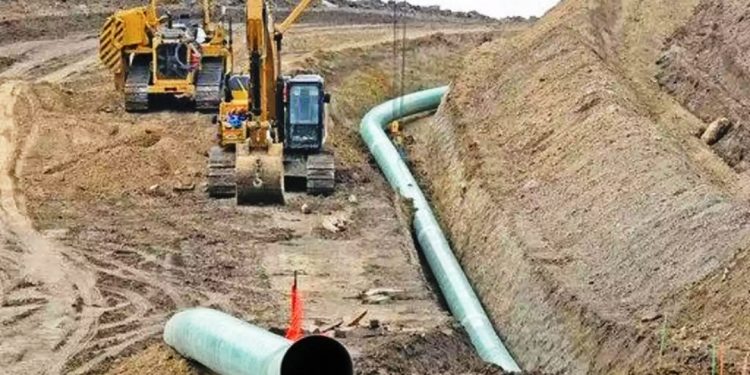Jajpur: Use of Baitarani river water in Kanpur dam near Anandapur in Keonjhar district for transportation of minerals through slurry pipelines may seriously affect the cultivation of Rabi and summer crops in Jajpur and Keonjhar districts.
Reports said that the state government has given its approval to 12 projects for transportation of minerals through slurry pipelines from various rivers in the state. There are five proposed slurry pipeline projects in the Baitarani river. The underground slurry pipelines will consume large volumes of water for transportation of minerals eventually leading to a water crisis.
The minerals were earlier transported by trucks. However, the laying of slurry pipelines has robbed over 50,000 truck owners of their livelihood.
The JSW Utkal Steel Ltd is one among the many firms that will transport 30 MT minerals per annum through slurry pipelines from Joda and Koida to Paradip via Jajpur district. The Water Resources department has given its approval for use of 39 cusecs of water by the firm from the Baitarani river.
Water will be lifted from the Kanpur irrigation project which is nearing completion upstream of Baitarani near Anandapur in neighbouring Keonjhar district.
However, the Water Resources department has directed not to use water from Kanpur irrigation project from the month of February to June so that it will not affect Rabi and summer crops in Keonjhar and neighbouring Jajpur. This has been decided in a water allocation committee meeting held by Water Resources department, September 4.
The decision is an indirect admission by the Water Resources department that use of water for transportation of minerals could even dry up the river and seriously affect the cultivation in both Keonjhar and Jajpur districts in all likelihood.
Residents in both districts apprehend that Baitarani river, which originates from Gonasika hill in Keonjhar district, will dry up if minerals are transported through slurry pipelines. They also fear that the famous ‘Baruni Snan’ held in Baitarani may become history soon as 13,100 hectare of farmlands in Dasarathpur, Binjharpur and Sadar blocks in Jajpur district will be deprived of water for cultivation.
Essar Steel is laying a slurry pipeline from Joda to Paradip for transportation of minerals while BRPL has already begun transporting mineral slurry through pipelines to its Kalinganagar plant in Jajpur. Many industrial firms have sought permission for the same.
These firms are also destroying forest cover on large tracts of land while laying slurry pipelines in Keonjhar, Jajpur, Kendrapara and Jagatsinghpur districts. These pipelines are passing 70km through reserve forest, 30km through protected jungle and 20km through other jungles.
Currently, various firms are laying slurry pipelines to Paradip via Barbil, Rimuli, Keonjhar, Anandapur, Jajpur Road, Kalinganagar and Chandikhole.
In a report, the Water Resources department has said that JSW will construct an intake wall at Mirigisingha on Baitarani to conserve and lift its water in rainy season.
The intake wall will be shifted near the Kanpur irrigation project after work is completed. The intake wall will be constructed about 16 km from the upstream of Kanpur dam.
However, a review conducted by the Water Resources department showed that it may lead to water scarcity for Rabi and summer crops. As a result, it has directed the industrial firms not to lift water from Kanpur dam from February to June so that 75 per cent of Rabi crops can be cultivated. Due to this reason, it has asked JSW to construct a reservoir on its plant premises to meet its water needs.
PNN







































